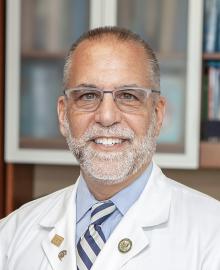
NINDS is mourning the death of Dr. Ralph Sacco, renowned stroke neurologist who enriched NINDS as a grantee, mentor, and member of the NINDS Advisory Council. Dr. Sacco passed away on January 17, 2023, due to a brain tumor. He was 65.
A preeminent expert in stroke epidemiology and health disparities, Dr. Sacco was the founding principal investigator of the Northern Manhattan Study (NOMAS), an ongoing NINDS-funded study of stroke and stroke risk factors among the multi-ethnic community of Northern Manhattan. He also led the Family Study of Stroke Risk and Carotid Atherosclerosis. He is remembered for his work to develop new approaches for early diagnosis and treatment of acute stroke patients through the Specialized Programs of Translational Research in Acute Stroke (SPOTRIAS) and his expertise in stroke prevention in the NIH StrokeNet. As a member of the NINDS Stroke Progress Review Group, he helped shape the scientific priorities of the institute’s stroke research program.
In 2010, Dr. Sacco was recognized with the NINDS Senator Jacob Javits Award in the Neurosciences for his work as an “exceptional, innovative stroke researcher.”
Most recently, Dr. Sacco was the chairman of neurology, executive director of the Evelyn McKnight Brain Institute, and Senior Associate Dean for Clinical and Translational Science at the University of Miami, Miller School of Medicine. He also served as chief of the neurology service at Jackson Memorial Hospital. A graduate of Cornell University and Boston University School of Medicine, he also held an MS in epidemiology from Columbia University.
Notably, Dr. Sacco is the only physician to have served as both the president of the American Heart Association (AHA) and the American Academy of Neurology (AAN).
As we mourn his passing, colleagues remember Dr. Sacco’s scientific excellence, his dedication to promoting diversity in scientific research, and his passion for mentoring the next generation of researchers. He will be remembered for his substantial contributions to the field of stroke research.
